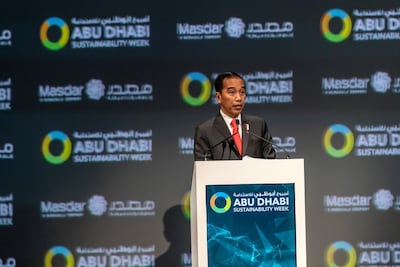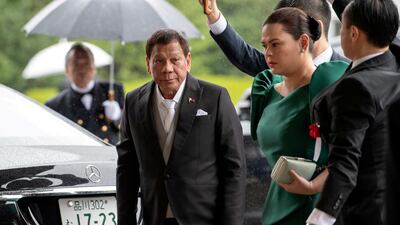Barack Obama famously observed that he was “confident” he could have won a third term as US president in 2016 had a constitutional amendment not prohibited him from doing so. “No drama Obama 0.3" would certainly have been a calmer alternative to the rollercoaster ride the world experienced under his successor, Donald Trump, but the question of term limits is not at all theoretical for many people now in South-East Asia – specifically, the nearly 400 million who live in Indonesia and the Philippines.
In the latter, current incumbent Rodrigo Duterte is legally only allowed one six-year term as president, but he has recently made it clear that he is giving serious consideration to running for the vice presidency in 2022, with his daughter Sara going for the top post instead of him. The two posts are elected separately, not as a ticket, and a recent survey showed the Dutertes leading the fields among potential candidates for both positions.
In Indonesia, President Joko Widodo has insisted that he isn’t interested in running for a third term – he is limited to two – but there has been persistent talk for months about amending the constitution to let him do so. Recently, a “national committee” of his supporters was formed to campaign for a referendum on the idea, the idea being that Jokowi, as Mr Widodo is known, should run in 2024 on a ticket with Prabowo Subianto, his two-time presidential opponent whom he appointed as his defence minister in 2019.
Both scenarios are possible.
There is no legal bar to Mr Duterte standing for the vice presidency. If he were to have such influence in that job over his daughter, should she be elected president, that he would remain the country’s de facto chief executive, it is hard to see how that could be challenged. Likewise, there is nothing in the law to forbid his daughter resigning so that Mr Duterte could then assume the presidency – although that would very clearly be against the spirit of the constitution.
In Indonesia, the People’s Consultative Assembly – the two chambers of the country’s parliament – would have to vote through an amendment to the constitution to remove the limit on presidential terms, but that is far from inconceivable. Further, it would be possible that such a vote could be mobilised even if Mr Widodo proclaimed he was not in favour of it – although some wonder whether he is protesting too much – because, quite unusually for presidents, he is a member of but not the leader of his own party.
A dim view is generally taken of attempts to extend or override term limits, and in both countries those limits were constitutionally enshrined to ensure that neither endured decades of authoritarian rule again, as they did under Ferdinand Marcos in the Philippines and Suharto in Indonesia. But that points to the fact that these are not venerable provisions going back to antiquity. The current Philippines constitution dates from 1987, while in the case of Indonesia, it was only in 1999 that legislation barring the president from more than two five-year terms was passed – a ruling absent from the country’s 1945 constitution.
In Indonesia, there could also be moves to return to the old system whereby the People’s Consultative Assembly elected the president, not the general population. That would not necessarily be less democratic; it would in effect be a turn towards a parliamentary system such as the UK’s, wherein the prime minister has to command the confidence of a majority of his or her peers, and can thus also be ejected by them at any point, not having the security of a separate mandate from the people.

Why would they want to stay in office longer than they are currently allowed? Mr Duterte may hope for protection from the International Criminal Court, which is planning an investigation into the thousands of people who have died during his administration’s war on drugs, but he would be perfectly entitled to argue that six years is far too short a time to implement far-reaching policies.
Even with 10 years under his belt by 2024, Mr Widodo could say the same – especially when compared with many other leaders such as Chinese President Xi Jinping, Russian President Vladimir Putin, late Singapore prime minister Lee Kuan Yew or former Malaysian prime minister Dr Mahathir Mohamad (in office the first time from 1981-2003). These leaders were – Mr Xi and Mr Putin still are – really able to take the long view.
Both Mr Widodo and Mr Duterte are still very popular. A survey last month found that going by polling so far, the latter is likely to step down as the most popular president since the fall of Marcos. Intriguingly, eight out of 10 Filipinos said they approved of Mr Duterte’s war on drugs. As one pollster put it: “Maybe they didn’t see it in terms of human rights violations. They probably viewed drug addicts as being against the law.” So, what international commentators – who are aghast at the idea of Mr Duterte somehow managing to remain in charge – consider the chief charge against him is actually a strength when it comes to his own citizens.
Ultimately, shouldn’t it be up to Filipino and Indonesian voters to decide if their current leaders should stay on? Making a fetish out of a clause in a constitution is a mistake, as is shown by America’s obsession with gun ownership – based on the Second Amendment idea that a “well-regulated militia” was necessary for the security of the new nation, which has nothing to do with the reality of the 21st century.
Constitutions should be living documents and adapt to their times. There can certainly be nothing sacred about rules put in place so recently in the Philippines and Indonesia. There have been many democratic transitions in both countries in subsequent years, with no sign of a new Marcos or another Suharto emerging. Perhaps they should not let the ghosts of the past cast too long a shadow over their lively, sometimes troubled, but always vibrant futures.

